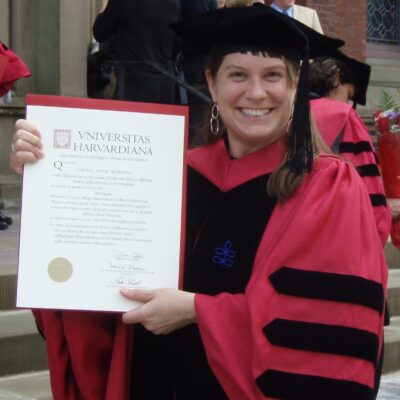Faculty Who Failed Series: Corrie Moreau

Corrie S. Moreau (as a doctoral student at Harvard in 2007) holding her diploma at commencement.
February 5, 2024
Graduate school is a time for students to push themselves, try new things, and explore. It’s also a time when students are likely to experience what feels like failure. These small or large challenges along the way to your degree are to be expected, and most faculty members experienced such stumbles themselves in graduate school.
To share stories of successful people who have overcome the setbacks that come with pursuing a graduate degree, we’re interviewing faculty members about how they “failed” in their academic careers. The Faculty Who Failed series highlights how resilience can carry you through the tough times in your degree program and come out of the experience stronger and better prepared for future challenges.
Read about College of Agriculture and Life Sciences Senior Associate Dean of Diversity, Equity, and Inclusion; Director and Head Curator of the Cornell University Insect Collection; and Martha N. and John C. Moser Professor in the Department of Entomology and the Department of Ecology and Evolutionary Biology Corrie Moreau‘s experiences.
Can you describe a time you felt like you failed in graduate school? This could be a time when an experiment didn’t work out, you considered leaving (or did leave) your program, etc.
Looking back at my time in graduate school I think my biggest failure was not bringing my full self to my graduate program from the beginning. Everyone else seemed to have everything so together and I felt like I had to appear the same way even though I was struggling with family issues back home. My mother was not mentally well and my brother was recently paralyzed due to a failed suicide attempt so I had to be on call to jump on a plane at any minute to go help out. I felt like I could not share this. I worried that my advisors and peers would think less of me (and my family background) since mental health was not as broadly talked about then. I also worried it would seem like I wasn’t dedicated to my research when I had to fly home without much notice to deal with the family emergencies that seemed to happen once or twice every year. It was emotionally draining to pretend to be doing exceptionally well in my research and graduate program and also have the weight of my family’s health and well-being always on my mind.
How did you bounce back from your perceived failure, or what got you through to the other side?
I didn’t share the weight I was carrying for the first two or three years of graduate school. When I finally did open up to my advisors and peers it felt like a giant weight off my shoulders. Not only did most support me, but my openness created the space for them to share similar experiences they were also struggling with and often hiding too. I suddenly didn’t feel so alone.
What lessons did you learn from this experience?
No one lives a perfect life and the more authentic you are with those around you the more accepted you feel for who you really are and the more welcomed you are into their lives.
How did you use this experience to become better at what you do?
I try to remind myself when others are not showing their best sides that they may have things going on in their lives that they are not able or ready to talk about and to give them some extra grace. I also now share my experiences, good and bad, so others know that being a professor or dean does not mean you have lived or live a perfect life.
What advice do you have for current graduate students who might be struggling or in a comparable situation?
You are perfect with all of your imperfections. You are exactly who you should be. You deserve to be here. We need your scholarly contributions and our diverse experiences make the academy a better place.
